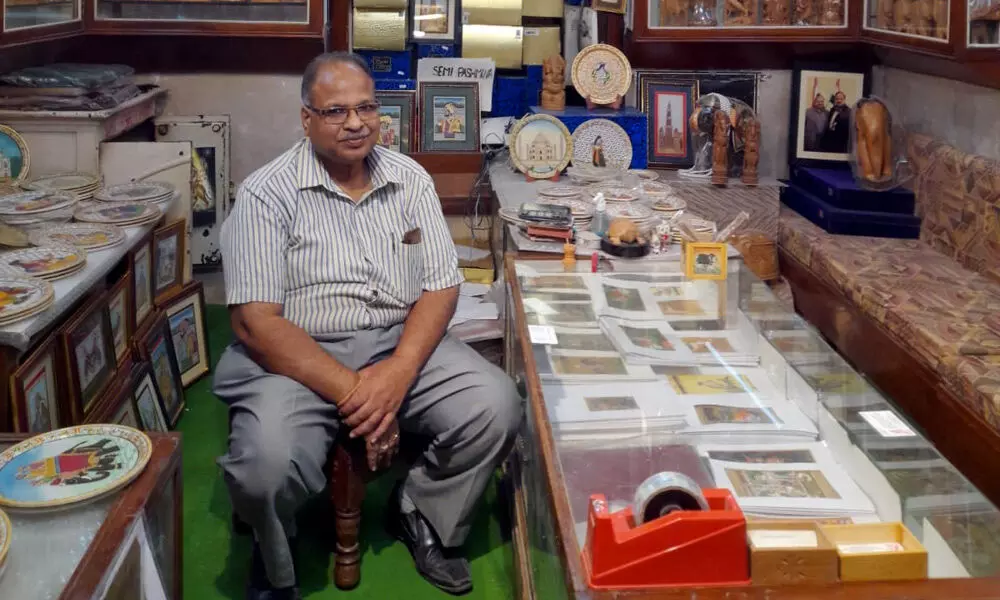Weathering the storm, legal hurdle and now pandemic
Set up in 1870, Indian Arts shop witnessed changing of four generations of the family that runs it; In year 2000, it fought against a PIL filed by Society For Culture and Heritage against the shop owners in a place of historical significance, and won; Now, Indian Arts along with other shops facing turbulent time as the ongoing pandemic worst hit arrivals of foreign tourists to Red Fort
image for illustrative purpose

New Delhi: The history of Red Fort holds many a story of Mughal rulers, revolution and freedom struggle, as the iconic red building now hosts thousands of tourists each day. But tales of freedom struggle aren't the only thing that brings the tourists to the vicinity. Shortly after entering the premise, visitors can see a long stretch of Bazaar which has been a part of the historical place for over a century.
Bizz Buzz spoke with Pradeep Kumar Gupta, owner of Indian Arts shop at the corridor of Red Fort, wherein he sells handmade artifacts such as paintings, sandalwood sculptures and artistic marble plates. One of the oldest shops at the Red Fort, Pradeep says the shop was initially set up by his great grandfather in 1870 during the British Rule. Since then, four generations of the family have run this business, with Pradeep being engaged in the profession for over 50 years. Souvenir collections, at this century old shop, has paintings handcrafted by Rajasthani artisans with pictures of Mughal emperors, courtesans, animals on rice paper and old stocks of India Post postcards.
"Any article older than 50 years cannot be sold. I procured handicraft items from a manufacturer 15 to 20 years ago and have been selling them to tourists here till date. There are items which may cost as low as Rs100 to Rs2,000. But I have not changed the essence of this shop since it was established. We sell portraits of Mughal emperors with Urdu encrypts made on rice paper and wooden sculptures of animals carved out of Abony wood and rose wood," Pradeep said.
However, the journey of keeping the shop alive has been as dramatic as the history of the fort itself.
Pradeep's business suffered major setback in the year 2000 when a Public Interest Litigation (PIL) was filed by Society For Culture and Heritage against the shop owners in a place of historical significance. According to Pradeep, separate cases were filed against all 47 shops in the vicinity with intentions to be removed them from the premises. A case was then filed by Municipal Corporation of Delhi (MCD) and which was then moved to Sessions Court. After Pradeep and fellow sellers won the battle against the removal of the local shops with Justice Vikram ruling in their favour, the Archaeological Survey of India (ASI) filed a case against them for their removal.
"The entire period is engrained in my head, as if all this happened yesterday only. After ASI filed a case against us in 2004, we fought the case in Delhi High Court for the next three years. The matter then went to a double Bench wherein ASI warned us that we might lose the case. But the judgement was ruled in our favour yet again and ASI issued a No Objection Certificate, which I signed," Pradeep recalled.
But the worst was yet to come, with pandemic hitting the operations. Pradeep says that for one whole year, the shops remained shut and only in June 2021, the business witnessed marginal growth. He says that revenues are now down by 80 per cent with foreign tourists no longer coming to Red Fort.
"Even before the pandemic we saw a shift in types of buyers. Back when VVIP cars were allowed inside, many diplomats from countries such as Kyrgyzstan, Romania, Bulgaria, Poland would make a purchase from here. Then the market was favoured by foreigners and now Indians. But due to Covid and its aftermath, the purchasing capacity of people have reduced. People mostly come here for window shopping," he said.
According to Pradeep, the entire handicraft industry was jolted by the sudden disruption, with many artisans moving to manual labour to earn their living. Artists who would usually paint a part of history on to the papers, were now suddenly switching to works such as vegetable selling, construction labour or even domestic help.
"All my savings of 20 years were utilised within 18 months due to Covid since there was no alternate mode of income. My sons and I run this shop and have no other alternate business. To sustain my family of seven members, I used all my savings. Now imagine, what would be the plight of those artisans," Pradeep expressed his plight.
The fourth-generation owner of the shop says that during the second wave, his wife had to be put on ventilator for close to a week upon her diagnosis with Covid. But Pradeep continues to maintain a positive outlook and says that art will not lose its value, with handmade artefacts will always take a precedence over machine-built items."I practically lived all my life at Red Fort. The museum here, Azaadi K Deewaney by National Musuem, was originally a primary school wherein I studied in my childhood. This shop is like amother to me," the 64-year-old said.

